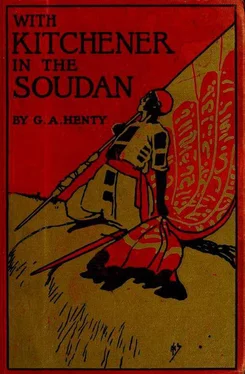At the end of the third week in January the three regiments from Lower Egypt had arrived at Wady Haifa, and the Seaforths at Assouan. At the beginning of February the British brigade was carried by railway to Abu Dis. Here they remained until the 26th, when they marched to Berber, and then to a camp ten miles north of the Atbara, where they arrived on the 4th of March, having covered a hundred and forty-four miles in six days and a half, a great feat in such a climate. Mahmud had made no movement until the 10th of February, when he began to cross the Nile to Shendy. This movement had not been expected by the Sirdar, and was hailed by him with satisfaction. Had Mahmud remained at Metemmeh he could, aided by the forts, his artillery, and the walled town, have offered a very formidable resistance. Had he marched along the banks of the Nile he would have been exposed to the fire of the gun-boats, but these could not have arrested his course. The country round Berber was favourable to the action of his cavalry, and if defeated he could have fallen back unmolested through Metemmeh on Omdurman; but by crossing the river he practically cut himself off from the Dervish base, and now had only a desert behind him, for we had taken over Kassala from the Italians, and the Egyptian battalion there and a large force of friendly Arabs would prevent him from retiring up the banks of the Atbara.
Mahmud's plan was to march along the Nile to Aliab, then to cross the desert to Hudi at an angle of the river whence a direct march of twenty-five miles would take him to Berber, and in this way he would avoid our strong position at the junction of the Atbara and the Nile. It would have been easy for the gun-boats to prevent Mahmud from crossing the Nile, but the Sirdar was glad to allow him to do so. The movement afforded him time to concentrate his force and to get up large supplies. For each day the distance that these could be transported by the railway had increased, and he saw that when the time for fighting came the victory would be a decisive one, and that few indeed of Mahmud's men would ever be able to make their way to Omdurman and swell the Khalifa's force there.
On one occasion, however, the gun-boats went up to watch what was going on, and take advantage of any opportunity that might offer to destroy some of Mahmud's boats, and thus render the work of his getting his force over slower and more difficult.
An entrenchment had been thrown up at the point where the Dervishes crossed, and this had been manned by two hundred and fifty riflemen. The Zafir steamed up close to the bank and opened fire with her Maxims. Another gun-boat sank one large craft and captured two others, and the troops landed and, covered by the fire of the guns, captured a fourth which had grounded in shallow water. A smaller boat was half-way across the river when the gun-boats arrived. It was seen that there were several women on board, and as the capture would have been of no value, no regard was paid to it. As it would have been as dangerous to return as to keep on, the boatmen plied their hardest to get across, but the stream carried them down near the Zafir. The boat was quite unnoticed, all eyes being intent upon the shore. She was passing about thirty yards astern of the gun-boat when a badly-aimed shell from a Dervish battery struck her, and she sank almost instantly.
Gregory, who was superintending the working of the Maxim nearest the stern, looked round at the sound of the explosion. Several of the occupants had evidently been killed, but two or three of the boatmen started to swim to shore. Only two of the women came to the surface, struggling wildly and screaming for help. With scarcely a thought of what he was doing, Gregory unclasped his sword-belt, dropped his pistol, and sprang overboard. One of the women had sunk before he reached them, the other was on the point of doing so when he caught her by the arm. She at once clung to him, and he had hard work to disengage her arm from his neck; then, after turning her so that her face was above water, he looked round. The gun-boat was already a hundred yards away. Her wheel was revolving, so as to keep her in her place facing the redoubt, and the stream was driving him fast away from her. Within ten yards of him was a black head, and a moment later Zaki was beside him. He had been working at Gregory's Maxim, and had suddenly missed his master.
Looking round he had seen him struggling with the woman in the stream, and without hesitation had leapt overboard.
"I am sorry you came," Gregory said, "for it is only throwing away your life. It is of no use shouting, for they could not hear us in that din, and if they happened to catch sight of us would take us for two of the black boatmen. I Bee the stream is taking us nearer to the bank."
Zaki had taken hold of the woman while he was speaking, " We might swim a long way down, master, if we let go oi her."
" I won't do that, Zaki. I know now that I was a fool to jump overboard, but now that I have done so I will save her life. Besides, I could not swim very far even without her; I am feeling the weight of my boots and clothes. Will you swim with us till I can touch the ground, and then leave us? Strike right into the river again—I know that you are a good swimmer—and drop down the stream until you reach one of the islands, and then you can land and hail the gun-boats as they come down. Tell Captain Keppel why I jumped over."
" I am not going to leave you, master. No doubt the Dervishes will shoot me, but my life is of no consequence, and I shall be glad to die by the side of so good a master."
The woman, who had ceased to struggle when Gregory shook off her grasp, was now conscious, as, with one of them supporting her on each side, her head was above water.
" They will not kill you," she said; " you have saved me, and they will be grateful."
Gregory had no faith whatever in Dervish gratitude.
"Well, Zaki," he said, "if you will not leave us we will strike at once for the shore. The gun-boats are nearly half a mile away now. There is just a chance that we may not have been noticed by the Dervishes, and may be able to hide in the bushes till the gun-boats return. When they see me they will at once send a boat ashore under cover of their fire, and take us off."
"There is a good chance of that, master," Zaki said cheerfully, "and the Dervishes are busy up there fighting, and will not think much of a little boat."
Three or four minutes later they were in shallow water. As soon as they landed, Gregory threw himself down utterly exhausted, and the woman sank down beside him, but not before hastily rearranging her veil. In a couple of minutes Gregory roused himself.
" I can climb the bank now," he said, " and the sooner we are hidden among the bushes the better." But as he spoke he heard the sound of galloping horsemen, and almost immediately an Emir on a magnificent animal, followed by a dozen Dervishes, dashed up. "Mahmud!" the woman cried as she rose to her feet, "it is I, Fatma!"
Mahmud gave a cry of joy, and waved his hand to his followers, who had already pointed their rifles at Gregory.
" These have saved me, my lord," the woman went on. " They jumped from their boat and reached me just as I was sinking, and have borne me up. For my sake you must spare their lives."
Mahmud frowned. He dismounted and went up to his wife. "Have I not sworn, Fatma," he said, "that I would slay every unbeliever who falls into my hands? How, then, can I spare even one who has saved your life?"
" Others have been spared who have been of service, my lord," she said. "There are Greeks and Egyptians who work your guns, and they were spared because they were useful. There is Neufeld, who lives under the protection of the Khalifa. Surely these men have done far more to deserve not only life but honour at your hands. They risked their lives to save mine. What follower of the Prophet could do more? They could not have known who I was, a woman they saw drowning. Are there any among the bravest of the tribes who would have done the same?"
Читать дальше












